Refreshing Exchanges' Reviewer Database
Writing about web page https://exchanges.warwick.ac.uk/peerreviewer
Today I finally hit the big red button on something I’ve been working on over the summer. This has been a task which has oscillated between being a labour of love, while also posing a seemingly Sisyphean task [1]. Thus, reaching its conclusion has brought a combination of relief and satisfaction but also unsurprisingly generated a bit more work for me before I could call it a day. It involved that most crucial of academic journal contributors: peer-reviewers. As I’ve mentioned before, peer-reviewers aren’t just an essential part of the Exchanges editorial workflow, they’re contributions and insights are deeply valued by the Editorial Team and authors alike.
In short, in my spare working moments I’ve been methodically working though our database of registered peer-reviewers and examining what each and every one of them has listed as their reviewer interests. Registered reviewer interests are crucial as these are what my editors and I search when we’re looking for people to participate in peer review of our submitted papers. The main part of my ‘summer fun’ exercise was to identify those people who’ve registered profiles and expressed a willingness to be potential reviewers for Exchanges, and examine what they say about themselves.
But, and it’s a big but, where registered reviewers haven’t listed any research interests then, well they’re essentially invisible to the editors when seeking potential peer-reviewers. If we don’t know what field you work in, or the areas of expertise you profess, then we’re not going to approach you as a reviewer. A surprising 38.5% of our registered reviewers turned out to have failed to supply this key information on their registered profiles. Hence, today’s figurative ‘button’ dispatched emails to those would-be reviewers identified as deficient in this respect, asking if they’d kindly spend a few moments reviewing their profiles and adding in this information.
This naturally uncovered over 40 dead email addresses, and while I’ve managed to correct a few, sadly I’ve removed the majority from our reviewer register. This won’t stop people re-registering with a new email address, something I’d strongly encourage, but does mean our reviewer database now only contains contacts with valid contact addresses. I’ve also had a number of nice chats with former and would be reviewers as a result, which is an unexpected bonus, as engaging with our readership and continuators alike is always a pleasure.
A further serendipitous part of this exercise was the chance to do some light data cleansing work on the rest of the reviewer profiles. Quite a few of these had reviewer interests somewhat confusingly listed, which means, I suspect, they’d have risked being overlooked by my editors. I’m happy now these registered reviewers will turn up more frequently and accurately when we’re looking for people to contribute to our quality assurance activities.
If you are one of our reviewers, then checking your review interests are up-to-date, accurate and complete is one of the most useful things you can do for our journal. Many of the reviewers who do have information on their interests, have only listed one or two areas, whereas five or more would be far more representative of a ‘good’ record. Updating your reviewer profile only takes a few moments and there are easy instructions on how to go about it [2].
Conversely, if you would like to register as a reviewer with us, then by all means please do consider it. You’ll likely find our peer-reviewer guidance helpful [3]. And if you've never peer-reviewed before - then can I recommend this excellent text to get you started [4].
In the meanwhile, I can now crack on with planning my workshops, meetings and presentations for the autumn term now, with this grand summer task solidly in the rear-view mirror.
---
[1] Foolishly I thought OJS might be able to run off a report for me, with a list of all reviewers lacking any entries in their review field, but it appears the way the database is designed or implemented makes this impossible. Or at least highly impractical for my tech support people. One of the many reasons why much better managerial reporting tools for the platform are right up at the top of my technical wishlist for the platform! The time they could save me is not inconsiderable.
[2] https://exchanges.warwick.ac.uk/FAQ#reviewers
[3] https://exchanges.warwick.ac.uk/peerreviewer
[4] http://www.plotina.eu/wp-content/uploads/2019/03/Introduction-to-Peer-Review-Guide.pdf #ShamelessSelfPromotion
 Gareth Johnson
Gareth Johnson


 Please wait - comments are loading
Please wait - comments are loading
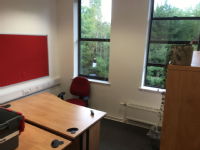
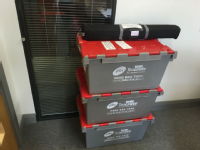

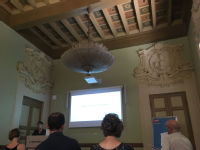
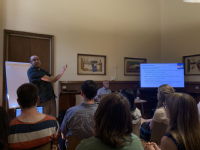
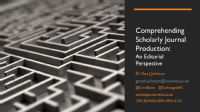


 Loading…
Loading…

